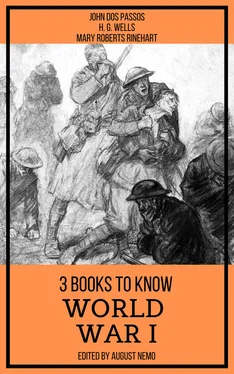“How much?”
“A franc; one of those looks like a quarter,” said the “Y” man, his well-fed voice full of amiable condescension.
“That's a hell of a lot for a cup of chauclate,” said Fuselli.
“You're at the war, young man, remember that,” said the “Y” man severely. “You're lucky to get it at all.”
A cold chill gripped Fuselli's spine as he went back to the stove to drink the chocolate. Of course he mustn't crab. He was in the war now. If the sergeant had heard him crabbing, it might have spoiled his chances for a corporalship. He must be careful. If he just watched out and kept on his toes, he'd be sure to get it.
“And why ain't there no more chocolate, I want to know?” the nervous voice of the man who had stood in line behind Fuselli rose to a sudden shriek. Everybody looked round. The “Y” man was moving his head from side to side in a flustered way, saying in a shrill little voice:
“I've told you there's no more. Go away!”
“You ain't got no right to tell me to go away. You got to get me some chocolate. You ain't never been at the front, you goddam slacker.” The man was yelling at the top of his lungs. He had hold of the counter with two hands and swayed from side to side. His friend was trying to pull him away.
“Look here, none of that, I'll report you,” said the “Y” man. “Is there a non-commissioned officer in the hut?”
“Go ahead, you can't do nothin'. I can't never have nothing done worse than what's been done to me already.” The man's voice had reached a sing-song fury.
“Is there a non-commissioned officer in the room?” The “Y” man kept looking from side to side. His little eyes were hard and spiteful and his lips were drawn up in a thin straight line.
“Keep quiet, I'll get him away,” said the other man in a low voice. “Can't you see he's not...?”
A strange terror took hold of Fuselli. He hadn't expected things to be like that. When he had sat in the grandstand in the training camp and watched the jolly soldiers in khaki marching into towns, pursuing terrified Huns across potato fields, saving Belgian milk-maids against picturesque backgrounds.
“Does many of 'em come back that way?” he asked a man beside him.
“Some do. It's this convalescent camp.” The man and his friend stood side by side near the stove talking in low voices.
“Pull yourself together, kid,” the friend was saying.
“All right, Tub; I'm all right now, Tub. That slacker got my goat, that was all.”
Fuselli was looking at him curiously. He had a yellow parchment face and a high, gaunt forehead going up to sparse, curly brown hair. His eyes had a glassy look about them when they met Fuselli's. He smiled amiably.
“Oh, there's the kid who's seen Fritzies' helmets in the movies.... Come on, buddy, come and have a beer at the English canteen.”
“Can you get beer?”
“Sure, over in the English camp.” They went out into the slanting rain. It was nearly dark, but the sky had a purplish-red color that was reflected a little on the slanting sides of tents and on the roofs of the rows of sheds that disappeared into the rainy mist in every direction. A few lights gleamed, a very bright polished yellow. They followed a board-walk that splashed mud up from the puddles under the tramp of their heavy boots.
At one place they flattened themselves against the wet flap of a tent and saluted as an officer passed waving a little cane jauntily.
“How long does a fellow usually stay in these rest camps?” asked Fuselli.
“Depends on what's goin' on out there,” said Tub, pointing carelessly to the sky beyond the peaks of the tents.
“You'll leave here soon enough. Don't you worry, buddy,” said the man with the nervous voice. “What you in?”
“Medical Replacement Unit.”
“A medic are you? Those boys didn't last long at the Chateau, did they, Tub?”
“No, they didn't.”
Something inside Fuselli was protesting; “I'll last out though. I'll last out though.”
“Do you remember the fellers went out to get poor ole Corporal Jones, Tub? I'll be goddamned if anybody ever found a button of their pants.” He laughed his creaky little laugh. “They got in the way of a torpedo.”
The “wet” canteen was full of smoke and a cosy steam of beer. It was crowded with red-faced men, with shiny brass buttons on their khaki uniforms, among whom was a good sprinkling of lanky Americans.
“Tommies,” said Fuselli to himself.
After standing in line a while, Fuselli's cup was handed back to him across the counter, foaming with beer.
“Hello, Fuselli,” Meadville clapped him on the shoulder. “You found the liquor pretty damn quick, looks like to me.”
Fuselli laughed.
“May I sit with you fellers?”
“Sure, come along,” said Fuselli proudly, “these guys have been to the front.”
“You have?” asked Meadville. “The Huns are pretty good scrappers, they say. Tell me, do you use your rifle much, or is it mostly big gun work?”
“Naw; after all the months I spent learnin' how to drill with my goddam rifle, I'll be a sucker if I've used it once. I'm in the grenade squad.”
Someone at the end of the room had started singing:
“O Mademerselle from Armenteers, Parley voo!”
The man with the nervous voice went on talking, while the song roared about them.
“I don't spend a night without thinkin' o' them funny helmets the Fritzies wear. Have you ever thought that there was something goddam funny about the shape o' them helmets?”
“Can the helmets, kid,” said his friend. “You told us all about them onct.”
“I ain't told you why I can't forgit 'em, have I?”
“A German officer crossed the Rhine;
Parley voo?
A German officer crossed the Rhine;
He loved the women and liked the wine;
Hanky Panky, parley voo.... ”
“Listen to this, fellers,” said the man in his twitching nervous voice, staring straight into Fuselli's eyes. “We made a little attack to straighten out our trenches a bit just before I got winged. Our barrage cut off a bit of Fritzie's trench an' we ran right ahead juss about dawn an' occupied it. I'll be goddamned if it wasn't as quiet as a Sunday morning at home.”
“It was!” said his friend.
“An' I had a bunch of grenades an' a feller came runnin' up to me, whisperin', 'There's a bunch of Fritzies playin' cards in a dugout. They don't seem to know they're captured. We'd better take 'em pris'ners!”
“'Pris'ners, hell,' says I, 'We'll go and clear the buggars out.' So we crept along to the steps and looked down.... ”
The song had started again:
“O Mademerselle from Armenteers,
Parley voo?
“Their helmets looked so damn like toadstools I came near laughin'. An' they sat round the lamp layin' down the cards serious-like, the way I've seen Germans do in the Rathskeller at home.”
“He loved the women and liked the wine,
Parley voo?
“I lay there lookin' at 'em for a hell of a time, an' then I clicked a grenade an' tossed it gently down the steps. An' all those funny helmets like toadstools popped up in the air an' somebody gave a yell an' the light went out an' the damn grenade went off. Then I let 'em have the rest of 'em an' went away 'cause one o' 'em was still moanin'-like. It was about that time they let their barrage down on us and I got mine.”
“The Yanks are havin' a hell of a time,
Parley voo?
“An' the first thing I thought of when I woke up was how those goddam helmets looked. It upsets a feller to think of a thing like that.” His voice ended in a whine like the broken voice of a child that has been beaten.
“You need to pull yourself together, kid,” said his friend.
Читать дальше












